(update property name) |
|||
| (10 révisions intermédiaires par 4 utilisateurs non affichées) | |||
| Ligne 1 : | Ligne 1 : | ||
| − | {{ | + | {{Tuto Details |
|Main_Picture=Open_Workshop_Setup_OpenWorkshopSetup-new-15.jpg | |Main_Picture=Open_Workshop_Setup_OpenWorkshopSetup-new-15.jpg | ||
|Licences=Attribution-ShareAlike (CC BY-SA) | |Licences=Attribution-ShareAlike (CC BY-SA) | ||
| − | |Description=Create a simple | + | |Description=<translate><!--T:1--> Create a simple workspace setup to manage and organise your tools and materials.</translate> |
|Area=Electronics, Machines and Tools, Recycling and Upcycling | |Area=Electronics, Machines and Tools, Recycling and Upcycling | ||
|Type=Creation | |Type=Creation | ||
| Ligne 15 : | Ligne 15 : | ||
|IsTranslation=0 | |IsTranslation=0 | ||
}} | }} | ||
| − | {{ | + | {{Introduction |
| − | |Introduction=Creating a organised workshop is key for your active work on projects. | + | |Introduction=<translate><!--T:2--> |
| + | Creating a organised workshop is key for your active work on projects. | ||
| − | So we came up with a simple and cheap way of doing it, the more | + | <!--T:3--> |
| + | So we came up with a simple and cheap way of doing it, the more materials you upcycle to build it, the more you can reduce the costs.</translate> | ||
}} | }} | ||
| − | {{ | + | {{Materials |
| − | |Material= | + | |Step_Picture_00=Open_Workshop_Setup_OpenWorkshopSetup-new-7.jpg |
| − | |Tools= | + | |Step_Picture_01=Open_Workshop_Setup_OpenWorkshopSetup-new-4.jpg |
| + | |Step_Picture_02=Open_Workshop_Setup_OpenWorkshopSetup-new-1.jpg | ||
| + | |Material=<translate><!--T:4--> | ||
| + | * 2x plywood (90x60cm, 90x120cm) | ||
| + | * nails (100, 60, 40, 25 mm) | ||
| + | * timber (for the box) + leftover plywood sheets | ||
| + | * long timber (120x7cm) | ||
| + | * boxes | ||
| + | * water bottles (1.0 & 0.5 l) | ||
| + | * solid wooden table (120x70x90cm)</translate> | ||
| + | |Tools=<translate><!--T:5--> | ||
| + | * hammer | ||
| + | * saw | ||
| + | * sissors | ||
| + | * tape measure | ||
| + | * water level | ||
| + | * square | ||
| + | * sandpaper | ||
| + | * documentation camera/smartphone cam</translate> | ||
}} | }} | ||
| − | {{ | + | {{Separator}} |
| − | {{ | + | {{Tuto Step |
| − | |Step_Title= | + | |Step_Title=<translate><!--T:6--> Space selection & preparation</translate> |
| − | |Step_Content= | + | |Step_Content=<translate><!--T:7--> |
| + | * You need a space where you can work, so at least 8x bigger than your original workshop spot | ||
| + | * use a corner of the room (about 2.0x1.0m Space minimum) | ||
| + | * keep lights and accessebillity in mind | ||
| + | * kreate an overview of tools and materials you have | ||
| + | * start looking for a good sized plywood for your tools (big) and your small materials (small) | ||
| + | * use a solid table as base for the construction (at least 90cm high and 70cm deep) | ||
| + | * have a powerplug close to it | ||
| + | * cut the wood sheets</translate> | ||
| + | |Step_Picture_00=Open_Workshop_Setup_Workspace-sketch.jpg | ||
| + | |Step_Picture_01=Open_Workshop_Setup_OpenWorkshopSetup-new-22.jpg | ||
}} | }} | ||
| − | {{ | + | {{Tuto Step |
| − | | | + | |Step_Title=<translate><!--T:8--> prepare tools & materials</translate> |
| + | |Step_Content=<translate><!--T:9--> | ||
| + | * sort materials and tools by type and usage | ||
| + | * cut the bottles to fill with materials (screws, bolts, nuts, washers, hooks, rivets etc.) | ||
| + | * place the tools in order on the ground to the sheet (try different setups) | ||
| + | * draw a fine line with a pencil around the tools | ||
| + | * cut the parts for the box and the skrewdriver board and add it to the wall setup | ||
| + | * nail everything to the board and remove the tools</translate> | ||
| + | |Step_Picture_00=Open_Workshop_Setup_OpenWorkshopSetup-new-6.jpg | ||
| + | |Step_Picture_01=Open_Workshop_Setup_OpenWorkshopSetup-new-9.jpg | ||
| + | |Step_Picture_02=Open_Workshop_Setup_OpenWorkshopSetup-new-10.jpg | ||
| + | |Step_Picture_03=Open_Workshop_Setup_OpenWorkshopSetup-new-8.jpg | ||
}} | }} | ||
| − | {{ {{ | + | {{Tuto Step |
| − | |Complete= | + | |Step_Title=<translate><!--T:10--> Fix the boards to the wall</translate> |
| + | |Step_Content=<translate><!--T:11--> | ||
| + | * nail the board to the wall. (you can also use screws) | ||
| + | |||
| + | <!--T:12--> | ||
| + | * Build up some boxes for materials like markers. | ||
| + | |||
| + | <!--T:13--> | ||
| + | * Draw the shapes of the materials and tools for easy identification after use. | ||
| + | * fix the timber board under the board, right above the table.</translate> | ||
| + | |Step_Picture_00=Open_Workshop_Setup_OpenWorkshopSetup-new-5.jpg | ||
| + | |Step_Picture_01=Open_Workshop_Setup_OpenWorkshopSetup-new-13.jpg | ||
| + | |Step_Picture_02=Open_Workshop_Setup_OpenWorkshopSetup-new-14.jpg | ||
| + | |Step_Picture_03=Open_Workshop_Setup_OpenWorkshopSetup-new-12.jpg | ||
| + | }} | ||
| + | {{Tuto Step | ||
| + | |Step_Title=<translate><!--T:14--> Fix tools and materials to the boards and finish up</translate> | ||
| + | |Step_Content=<translate><!--T:15--> | ||
| + | * Tools and materials should be fixed based on there shapes. | ||
| + | |||
| + | <!--T:16--> | ||
| + | * Balance both sides to reduce more weight on one side</translate> | ||
| + | |Step_Picture_00=Open_Workshop_Setup_OpenWorkshopSetup-new-18.jpg | ||
| + | |Step_Picture_01=Open_Workshop_Setup_OpenWorkshopSetup-new-17.jpg | ||
| + | |Step_Picture_02=Open_Workshop_Setup_OpenWorkshopSetup-new-20.jpg | ||
| + | |Step_Picture_03=Open_Workshop_Setup_OpenWorkshopSetup-new-25.jpg | ||
| + | |Step_Picture_04=Open_Workshop_Setup_OpenWorkshopSetup-new-26.jpg | ||
| + | }} | ||
| + | {{Tuto Step | ||
| + | |Step_Title=<translate><!--T:17--> Tips & WATCH YOUR TOOLS</translate> | ||
| + | |Step_Content=<translate><!--T:18--> | ||
| + | * Always ensure the open training space is neat and clean. | ||
| + | |||
| + | <!--T:19--> | ||
| + | * Keep off children near the work space. | ||
| + | |||
| + | <!--T:20--> | ||
| + | * The work space should be dust free at all times | ||
| + | |||
| + | <!--T:21--> | ||
| + | * Ensure to bring back tools and materials taken from the work space. | ||
| + | |||
| + | <!--T:22--> | ||
| + | * Should be free from water since some of the tools rusts.</translate> | ||
| + | |Step_Picture_00=Open_Workshop_Setup_OpenWorkshopSetup-new-24.jpg | ||
| + | |Step_Picture_01=Open_Workshop_Setup_OpenWorkshopSetup-new-23.jpg | ||
| + | |Step_Picture_02=Open_Workshop_Setup_OpenWorkshopSetup-new-19.jpg | ||
| + | |Step_Picture_03=Open_Workshop_Setup_OpenWorkshopSetup-new-27.jpg | ||
| + | }} | ||
| + | {{Notes | ||
| + | |Notes=<translate></translate> | ||
| + | }} | ||
| + | {{Tuto Status | ||
| + | |Complete=Published | ||
}} | }} | ||
Version actuelle datée du 9 décembre 2019 à 11:47
Create a simple workspace setup to manage and organise your tools and materials.
Difficulté
Facile
Durée
8 heure(s)
Catégories
Électronique, Machines & Outils, Recyclage & Upcycling
Coût
100 USD ($)
Introduction
Creating a organised workshop is key for your active work on projects.
So we came up with a simple and cheap way of doing it, the more materials you upcycle to build it, the more you can reduce the costs.
Matériaux
- 2x plywood (90x60cm, 90x120cm)
- nails (100, 60, 40, 25 mm)
- timber (for the box) + leftover plywood sheets
- long timber (120x7cm)
- boxes
- water bottles (1.0 & 0.5 l)
- solid wooden table (120x70x90cm)
Outils
- hammer
- saw
- sissors
- tape measure
- water level
- square
- sandpaper
- documentation camera/smartphone cam
Étape 1 - Space selection & preparation
- You need a space where you can work, so at least 8x bigger than your original workshop spot
- use a corner of the room (about 2.0x1.0m Space minimum)
- keep lights and accessebillity in mind
- kreate an overview of tools and materials you have
- start looking for a good sized plywood for your tools (big) and your small materials (small)
- use a solid table as base for the construction (at least 90cm high and 70cm deep)
- have a powerplug close to it
- cut the wood sheets
Étape 2 - prepare tools & materials
- sort materials and tools by type and usage
- cut the bottles to fill with materials (screws, bolts, nuts, washers, hooks, rivets etc.)
- place the tools in order on the ground to the sheet (try different setups)
- draw a fine line with a pencil around the tools
- cut the parts for the box and the skrewdriver board and add it to the wall setup
- nail everything to the board and remove the tools
Étape 3 - Fix the boards to the wall
- nail the board to the wall. (you can also use screws)
- Build up some boxes for materials like markers.
- Draw the shapes of the materials and tools for easy identification after use.
- fix the timber board under the board, right above the table.
Étape 4 - Fix tools and materials to the boards and finish up
- Tools and materials should be fixed based on there shapes.
- Balance both sides to reduce more weight on one side
Étape 5 - Tips & WATCH YOUR TOOLS
- Always ensure the open training space is neat and clean.
- Keep off children near the work space.
- The work space should be dust free at all times
- Ensure to bring back tools and materials taken from the work space.
- Should be free from water since some of the tools rusts.
Published
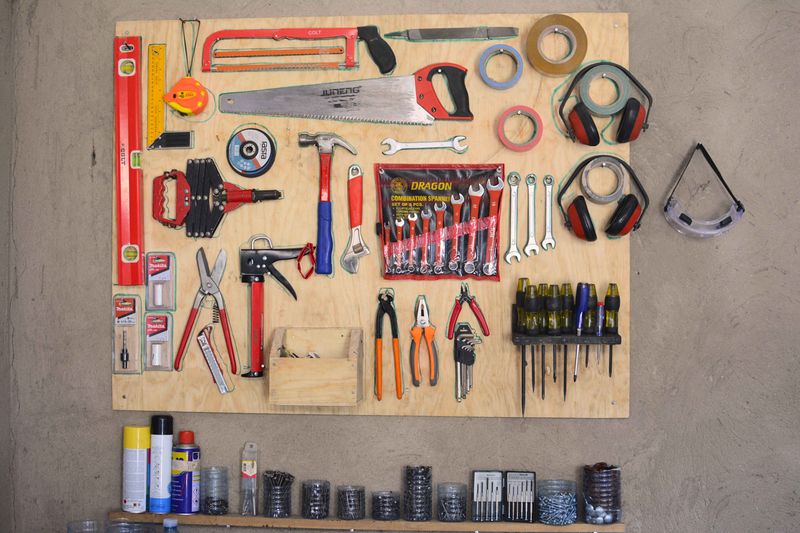
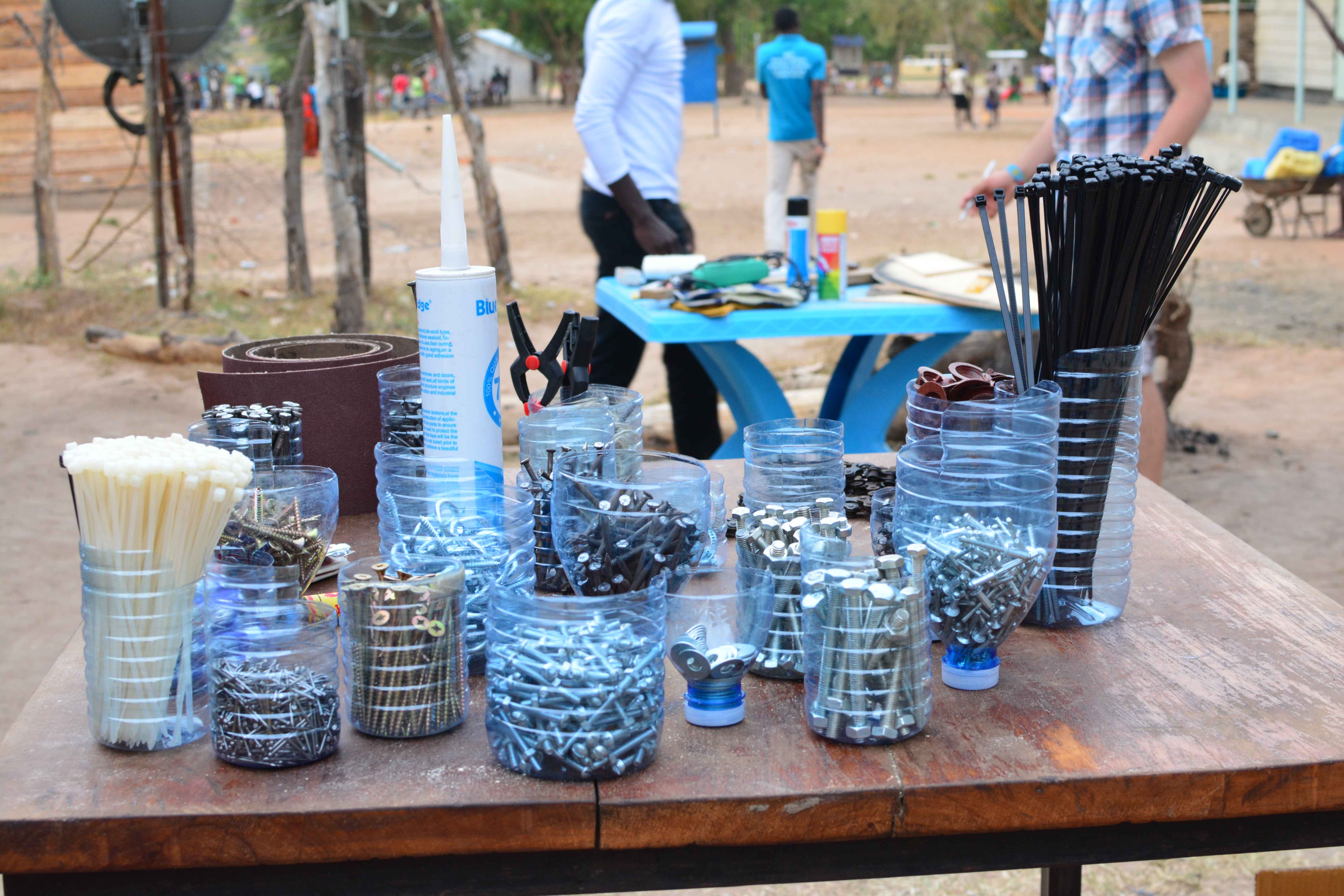
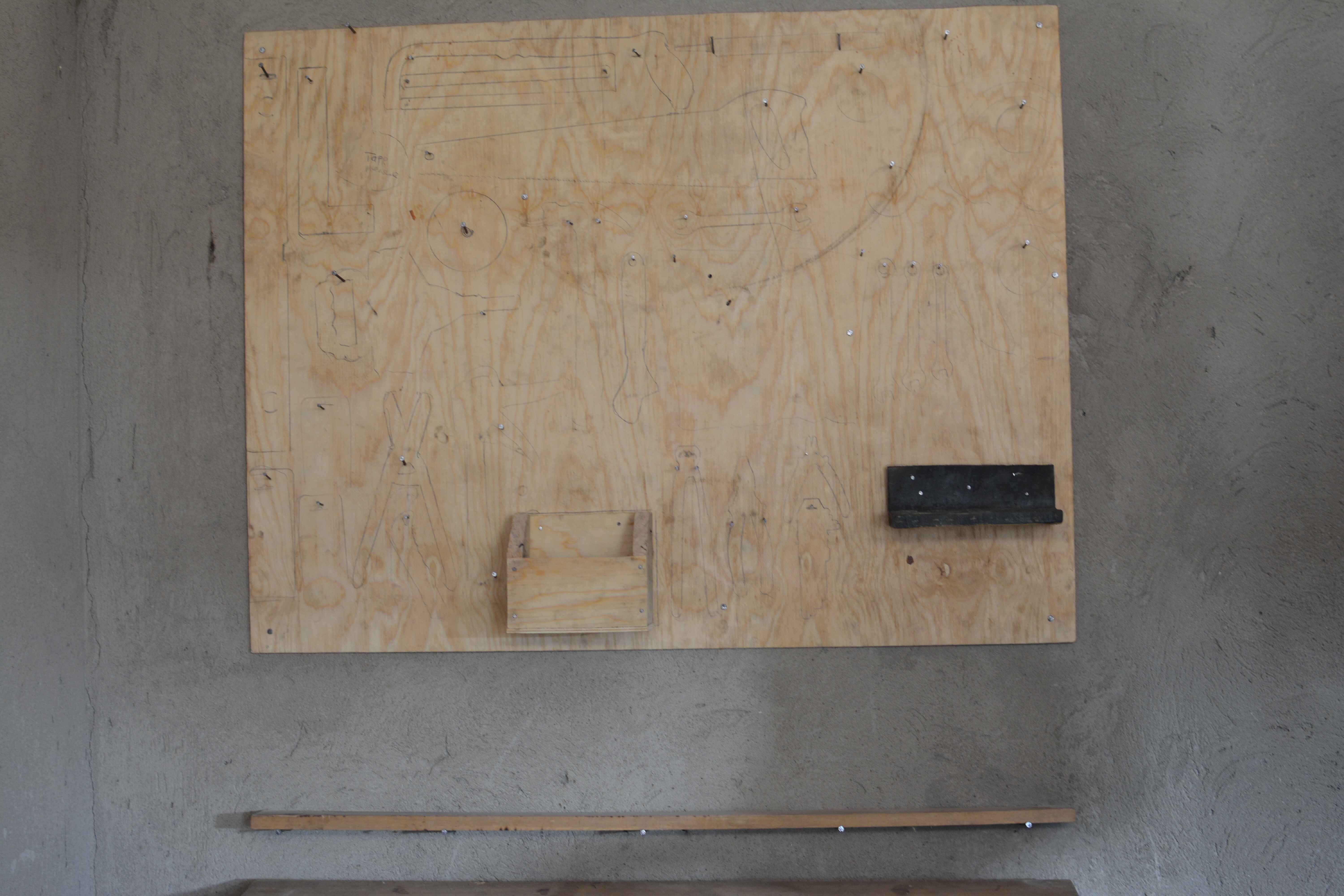
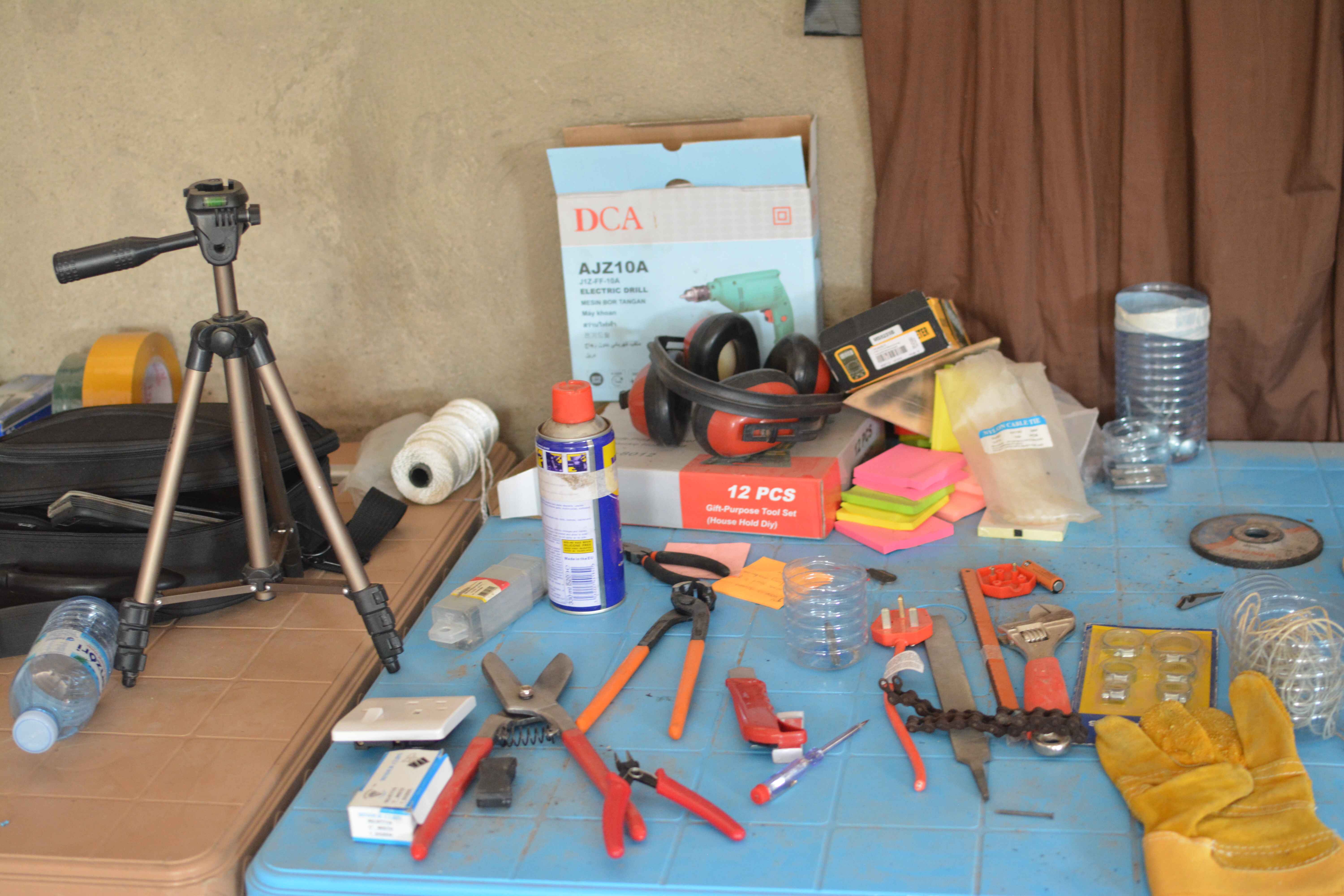
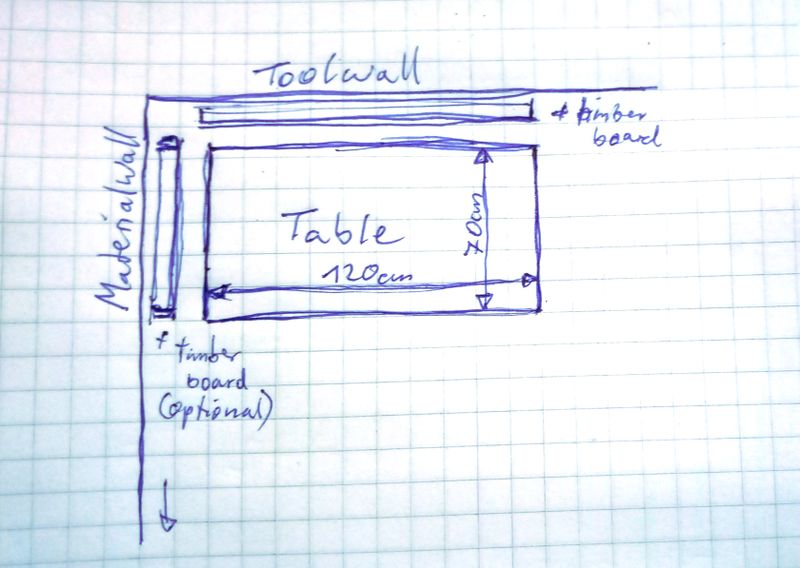
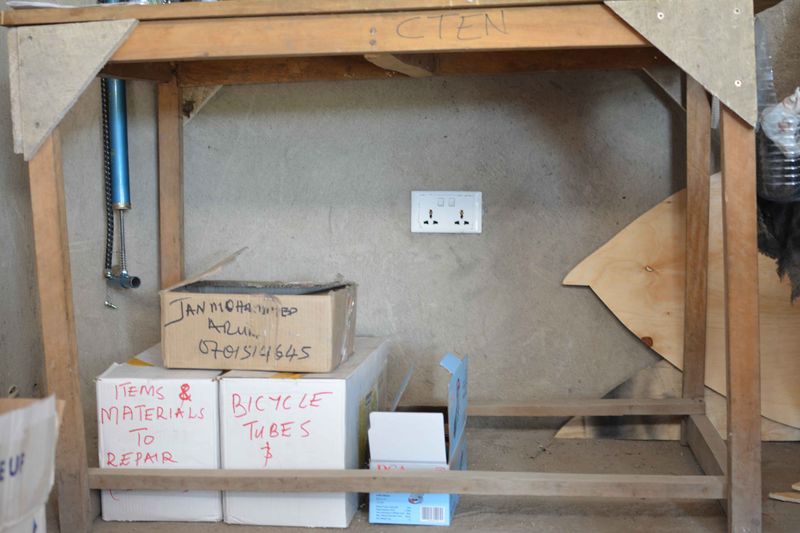
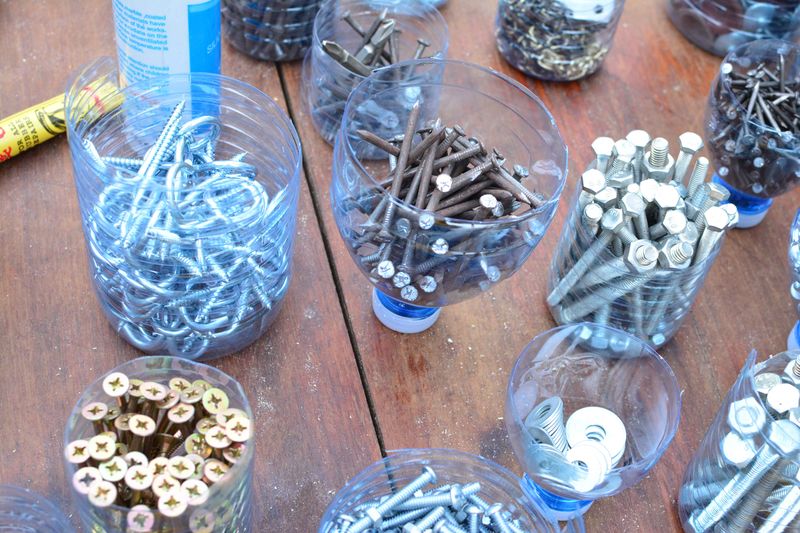
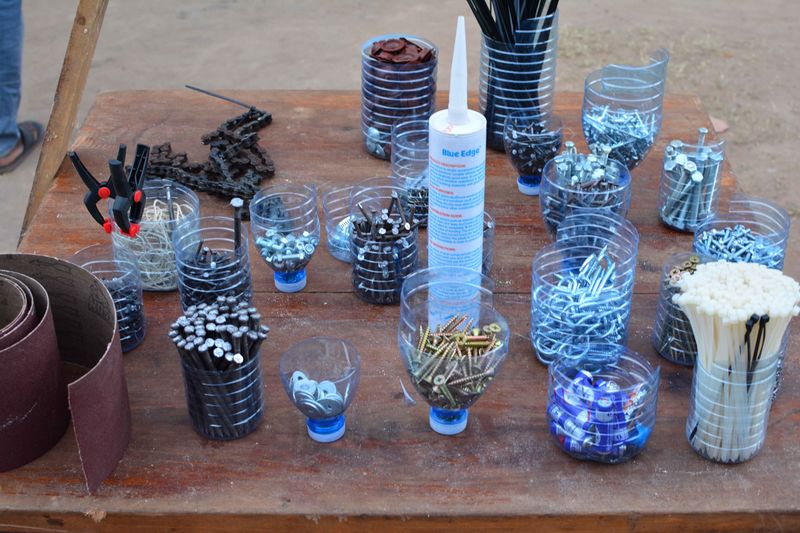
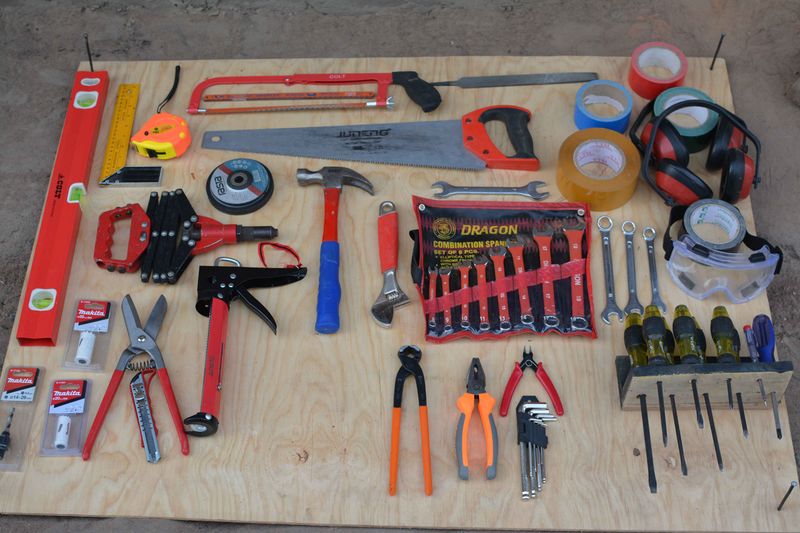
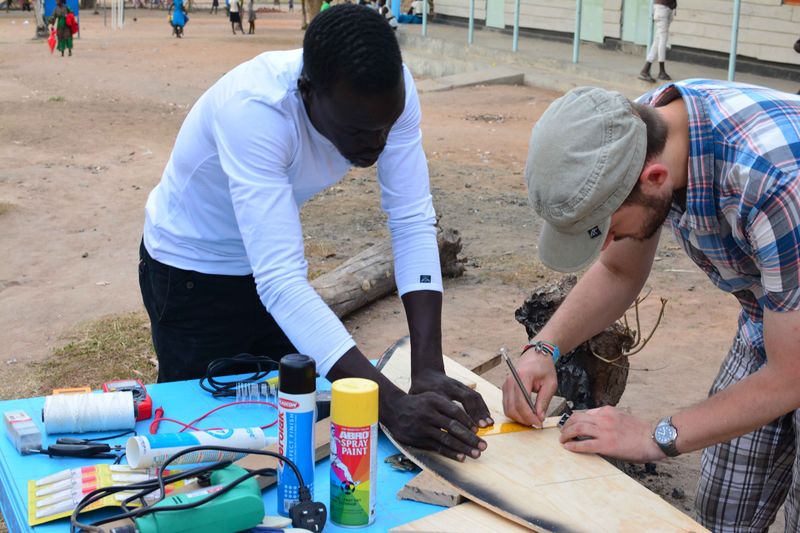
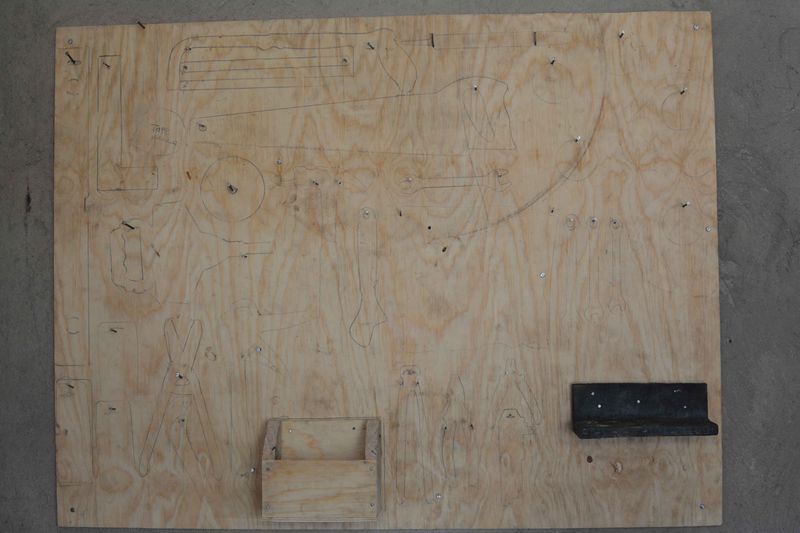
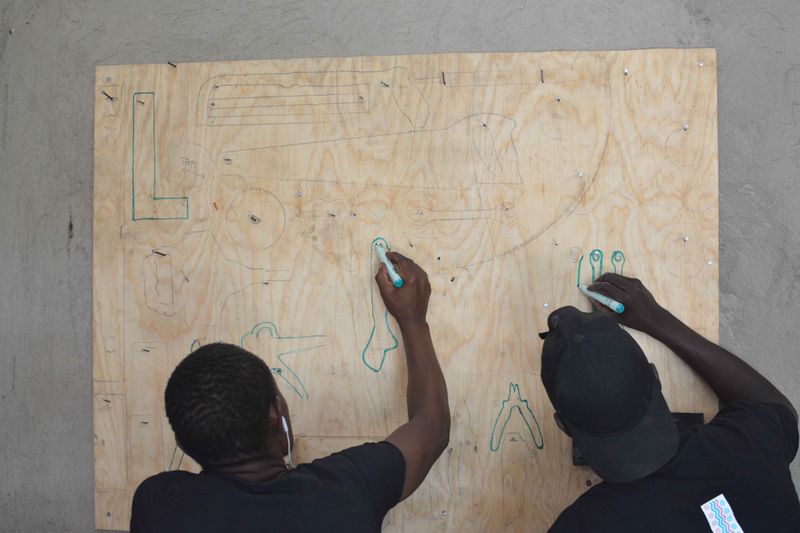
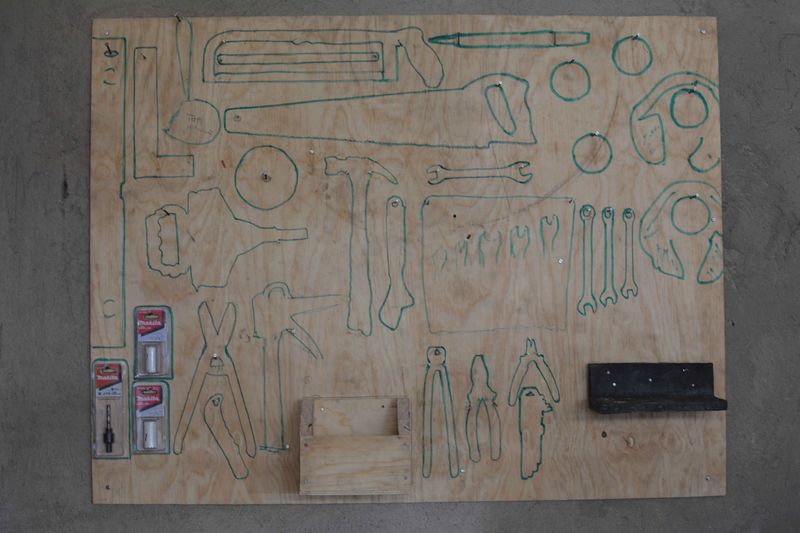
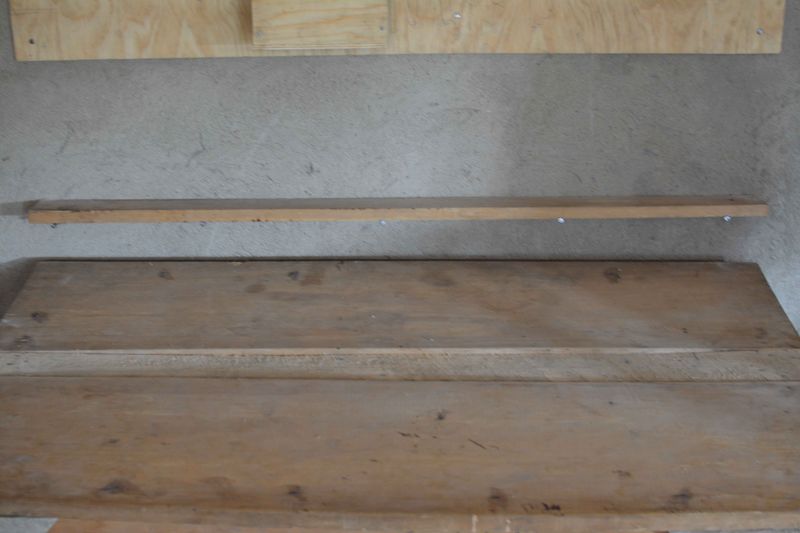
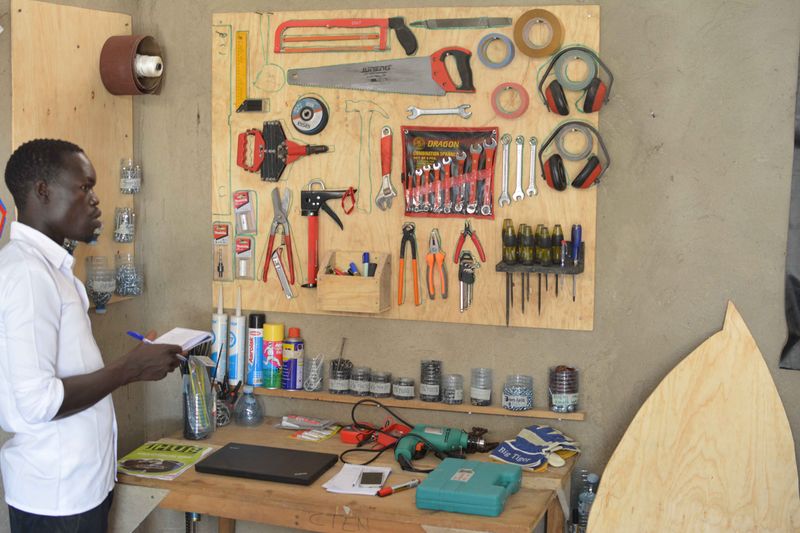
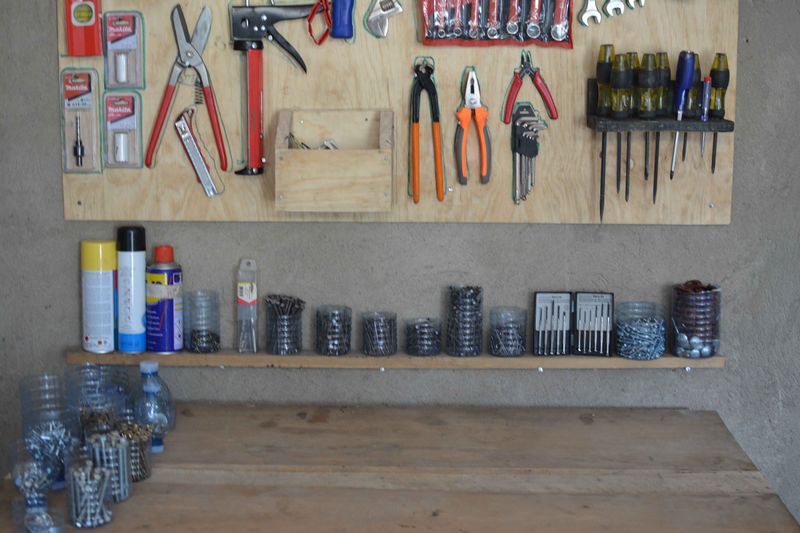
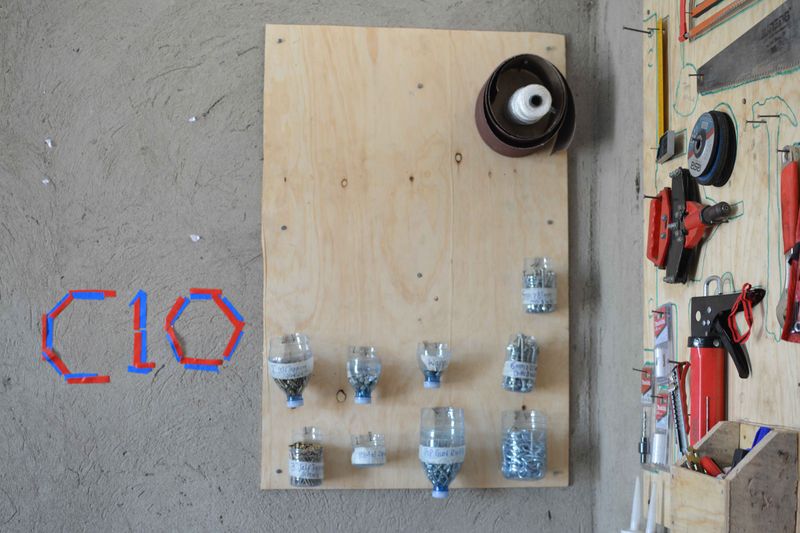
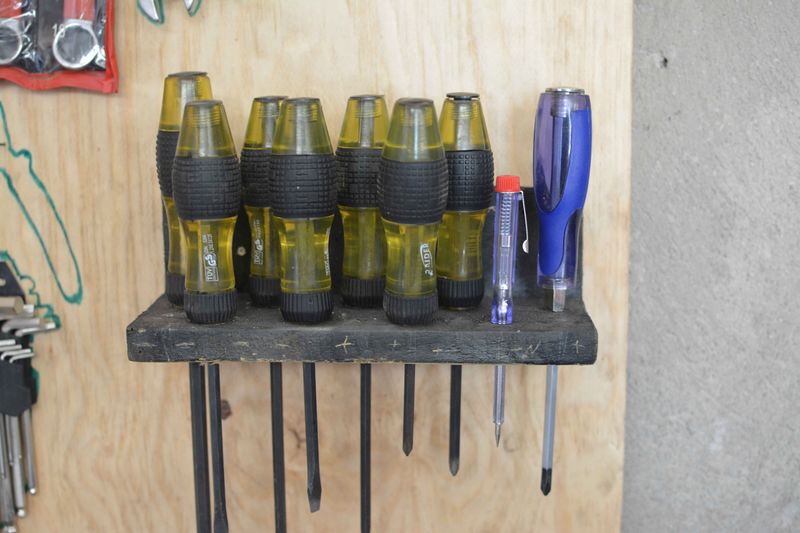
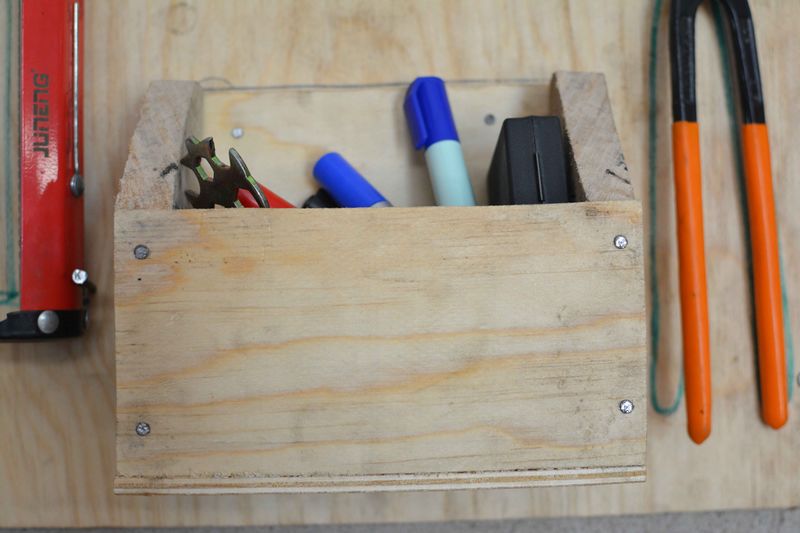
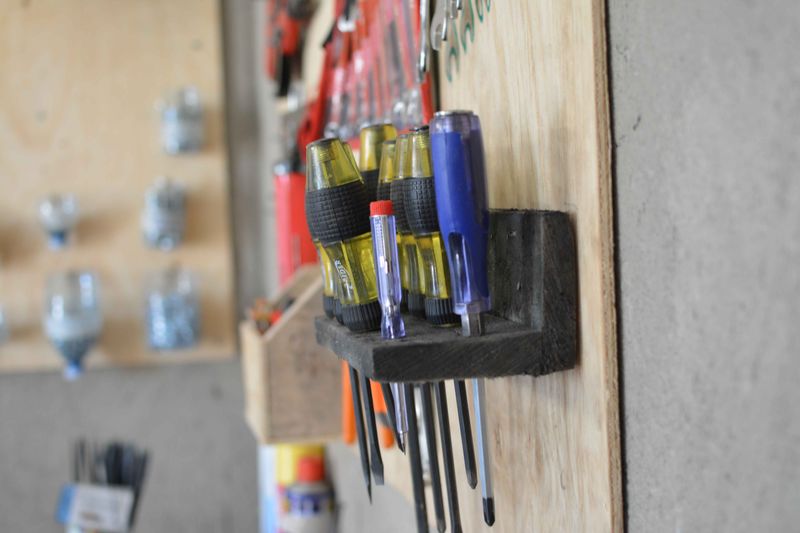
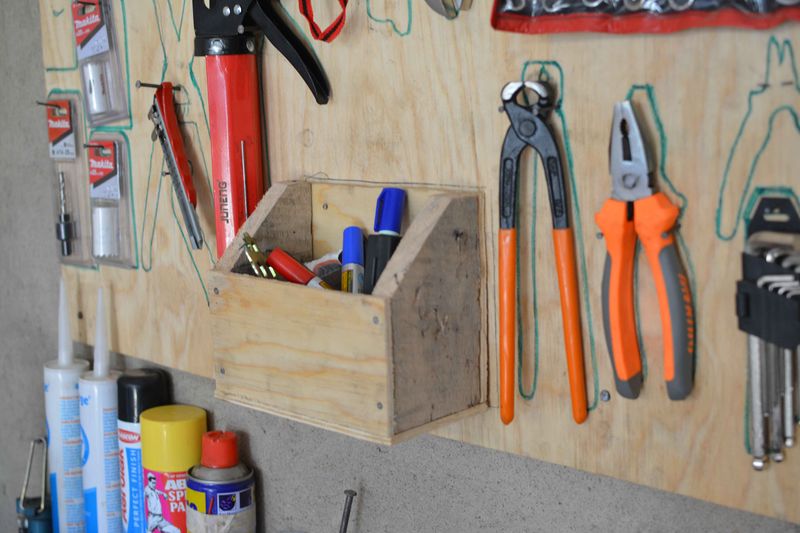
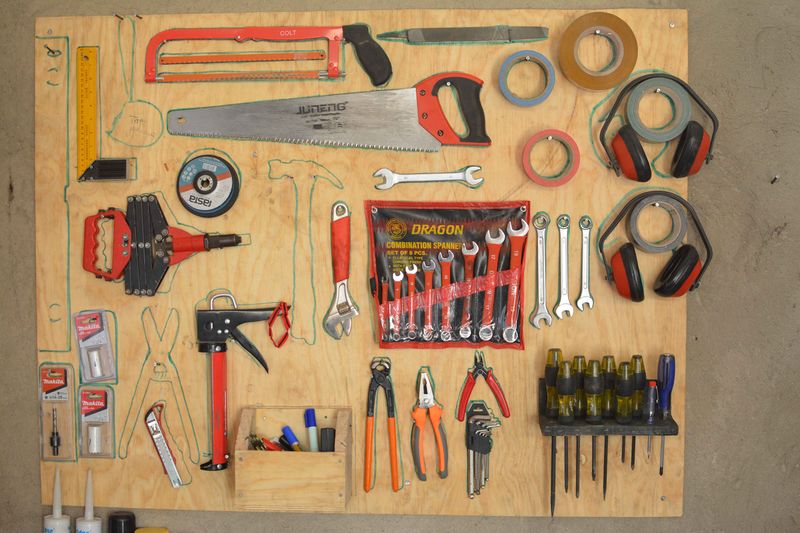
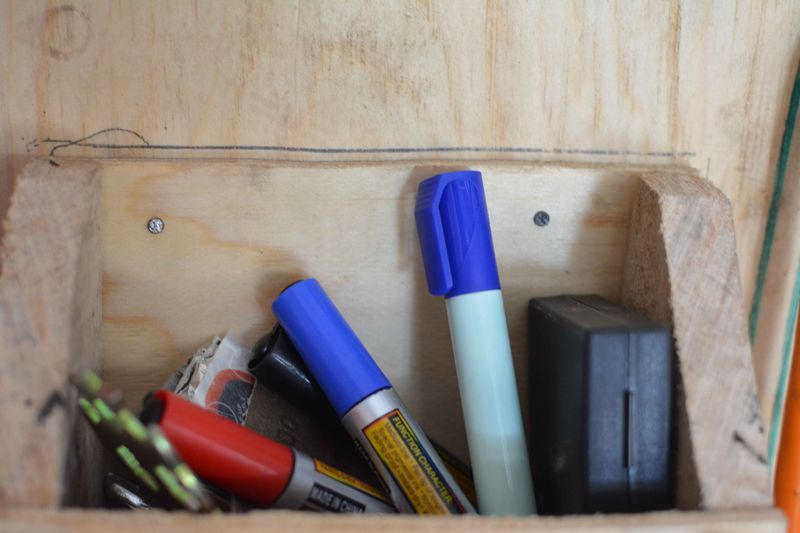
 Français
Français English
English Deutsch
Deutsch Español
Español Italiano
Italiano Português
Português